A review of the first Sidonia no Kishi anime series
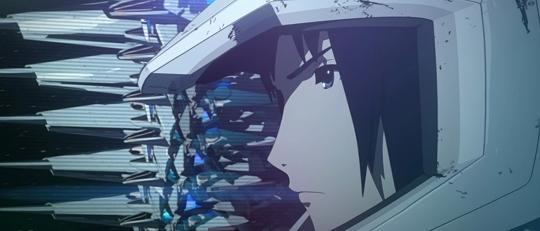
The first trailer that I saw for Sidonia no Kishi (Knights of Sidonia) was linked to by someone who was obviously very excited at the prospect of the series. For me, the trailer produced only indifference: giant robots, monsters, space; I’ve seen all of this before. Even the post-broadcast Netflix announcement trailer wouldn’t have convinced me, and I only saw that having watched the whole series. The core issue being that robots fighting in space is an easy sell but it’s not what makes Sidonia a special series. You can’t tout super-massive architecture, questioning the nature of humanity or glorious science-fiction as selling points in a minute and thirty seconds.
what humanity was before has ceded to pragmatism and necessity, to survive it must change and adapt
Many people have categorised the series as “hard” science-fiction which seems like a misuse of the term. Sidonia is very rich, but its use of laborious and detailed scientific explanations is extremely limited and most of the time non-existent - this isn’t Banner of the Stars. This is about a gargantuan colony “seed” ship, the titular Sidonia, floating through the cosmos defending itself against grotesque aggressors, the Gauna.
Read the rest of this entry
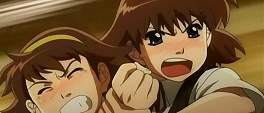
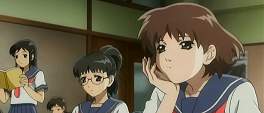
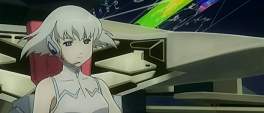
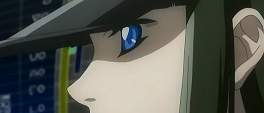
It would be easy to be confused as to just where exactly Blue Drop sits in terms of genre if one went by the first three episodes: perhaps the all-girl school histrionics would give some indication, but juxtaposed with operatic science fiction it would seem that maybe the series is trying to tell a different, as yet, hidden story touching on old Gundam favourites such as the horrors of war or its effect on children. Blue Drop actually occupies the secret third option and the hint lies in the source manga's genre: yuri.
The quiet, fringe-afflicted girl shows up in an entirely out-of-place outfit consisting of a leotard crossed with navy regalia
This divulgence is able to put a lot of the introductory material into context, and while it certainly doesn't contain anything near the raunchy material of the manga, Blue Drop still seems uncertain as to who the series is aimed at. The character design is less than stellar, it seems that clichés are born and bred in the school the central characters attend and the animation does nothing to compensate for this, instead the aesthetics feel washed out and less than enticing. Development is restricted to the protagonist only, and the revelation that her nemesis is captain of a futuristic underwater craft comes across as more underwhelming than it was perhaps meant to. So with the interpersonal relationships and sexual content that series should have inherited from its parent missing, and the other typical trappings of the yuri genre absent, the question of what exactly the series offers becomes difficult to answer.
Read the rest of this entry

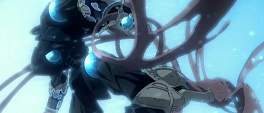


There is only one way to describe the scope and scale of Heroic Age: operatic. Far from the derogatory connotations of "Space Opera" championed by other anime such as Sekai no Senki (Banner of the Stars), it is a grand yet personal series which is ceaselessly ambitious, frequently breathtaking and always graceful and poised in its delivery. It is as diverged from the trappings of pulpy space opera as can be by excelling at both the intimate moments and the monumental battles.
favouring silence over exposition and meandering thoughts versus concrete conclusions
From Angela's typically vast opening through the orchestral stirrings comprising the bulk of the soundtrack to the tender melody of Ishikawa Yui's closing, even the audio of the series is grandiose, evocative and fitting as battles are fought, lives lost and emotions plucked. The most prominent part of Heroic Age is the epic battles fought across light-years and planets, yet even this is but a small part of the series as it never allows itself to be nailed down to one narrative device, switching seamlessly from a light hearted fish-out-of-water story to the machinations of the deity-like antagonists. The surprisingly large cast of characters are expertly fleshed out and range from fatally stupid to dashingly honourable; Deianeira, the protagonist and a royal princess, is pitched as the prototypical naive leader, however her astute decision making rightly inspires the most indomitable loyalty and by the climax her role as a strong, impassioned woman is unquestionable.
Read the rest of this entry
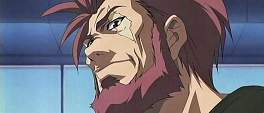
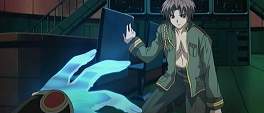
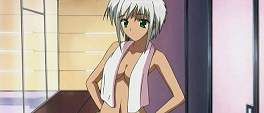
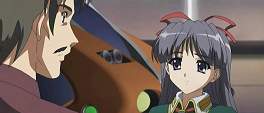
Soul Link is absolute, unmitigated dross. It fails on all levels to entertain, engage, or even hold interest beyond the few minutes of morbid curiosity it takes to realise what uninspiring mediocrity it is. It has neither the aesthetics, the intelligence or the big names to let the series be even passable and each episode ends up being twenty minutes of utter drivel where one feels they've lost far more than they've gained by watching it.
overlooking the fact that a hardened terrorist organisation employs a diminutive, top-heavy girl in hot-pants
Liberally adapted from an erotic visual novel by Navel, Soul Link doesn't even have the decency to integrate fan-service or any kind of racy content; the best the bargain-basement visuals can come up with is the leather-clad dominatrix masquerading as an antagonist and a mercenary with breasts which look like they've been badly modelled after a Madonna video. With no naughtiness in sight, the series is left to scratch around in the dirt and try and come up with some kind of manufactured drama which, ultimately, the characters are too incompetent to do anything about.
Read the rest of this entry












